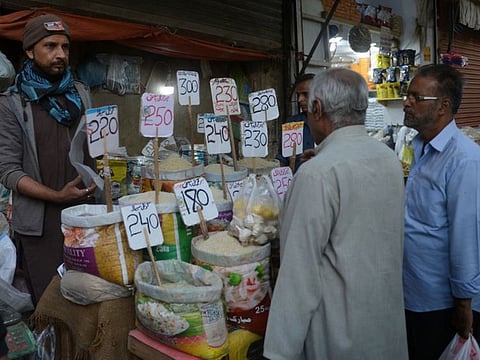Pakistan: 48-year high inflation hits middle-class hard
Food and energy prices continue to soar as inflation reaches highest levels since 1975

Islamabad: Pakistan inflation reached a nearly five-decade high in January, with consumer prices reaching 27.55 per cent compared to the previous year, according to statistics bureau data. This is the biggest consumer price hike since 1975.
The year-on-year inflation was the highest since May 1975, according to Arif Habib Limited, a Karachi-based investment firm. The consumer prices were up 2.9 per cent in January compared to the previous month, the Pakistan Bureau of Statistics (PBS) said. The recorded inflation in urban areas increased to 24 per cent and 32 per cent in rural regions areas year-on-year.
Pakistan’s inflation is accelerating at the fastest rate on record amid continuous currency devaluation, hikes in interest rates, fuel prices, and the economic slowdown with thousands of containers of food and raw materials held up at ports due to import restrictions.
Inflation hurting middle class
The 48-year high inflation in crisis-hit Pakistan has sent prices for food, gas, electricity, and rents surging. The rising prices are not just hurting lower-income households but also walloping middle-class Pakistanis, with many saying their earnings are falling behind the cost of living. Tazeen Akbar, who has a six-member middle-class family in Rawalpindi, is worried that her children might not be able to afford private colleges.
“Right now, we are struggling to cover the necessities so plans for good colleges and the house are out of the question.” Tazeen, who is working as a teacher, says he and her husband both are actively looking for a second job to cover family expenses.
Millennial members of the middle class say they are significantly cutting back their spending. Amjad Ali, 34, says he is more worried about the months ahead. “It’s hard to be optimistic because there has been no stability for months. It is a shame that even the middle class is worried about the prices of bread, milk, and eggs” says Ali, who works in the financial sector.
Pakistanis on social media are criticising the government for failing to address the cost-of-living crisis. “There are only the elite and lower class left in Pakistan. The middle class has been wiped out,” wrote a Twitter user named Araiz Naji.
Inflation likely to surge
With prices rising every day, there seems to be no solution or respite in sight. Experts have warned that the prices will likely continue to increase as the Pakistani government has begun discussions with a visiting International Monetary Fund (IMF) mission to unlock the much-needed $1.1 billion. The loan comes with tough conditions set by the IMF. While Pakistan has “no choice but to agree” to the IMF’s terms to support the economy, the finalization of the loan agreement is expected to push the inflation rate to an all-time high, experts say. Pakistan’s government recently raised petroleum prices and devalued the national currency
Sign up for the Daily Briefing
Get the latest news and updates straight to your inbox



